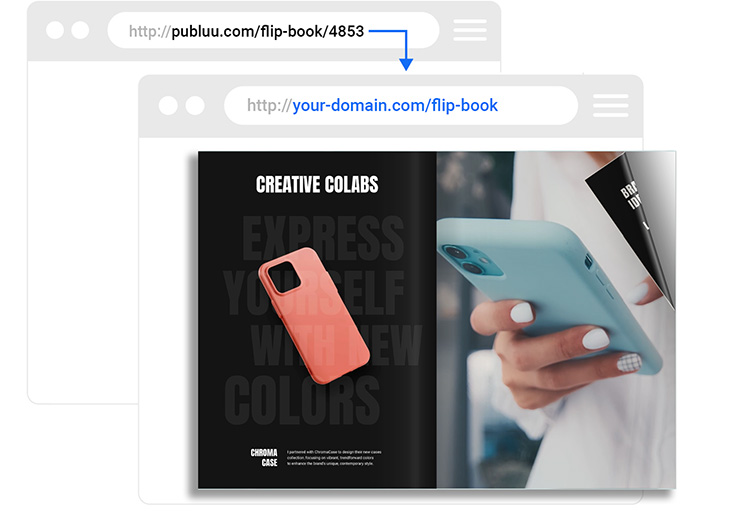What is a custom domain – benefits, how to choose and connect
These days, having a professional website is essential, whether you're a student, freelancer, or business owner. Your website is your online calling card. But great design alone isn’t enough. Your site also needs a clear and memorable web address so people can easily find you. That’s where a custom domain comes in and makes all the difference.

In this article, we’ll break down what a custom domain is, why it’s important, and how to choose and set one up for your business. And if you’re using an online flipbook to showcase your work, we’ll also guide you through connecting a custom domain to your Publuu account.
What is a custom domain?
A custom domain is a unique web address (URL) that you register for your website.
Example ⤵
If you’re starting a pet shop called Zoo Crew, you might want the domain zoocrew.com. But if that’s already taken, you could go with something like zoocrewpetstore.com or a similar variation that looks more professional and helps match your brand identity.
Unlike free subdomains (like zoo-crew.wordpress.com or zookrew.blogspot.com), a custom domain is fully branded and tailored to your business or personal name. It’s also different from a generic domain. For instance, petshopberlin.com tells people what and where the business is, but it doesn’t include the shop’s name or anything unique.
A custom domain, on the other hand, clearly connects your web address to your specific brand. Every custom domain also includes a TLD (top-level domain) - the part after the dot. Common TLDs include:
- .com (for businesses)
- .org (for organizations)
- .gov (for government sites)
- Country-specific ones such as .de (Germany) or .tv (used by a small country, Tuvalu, but popular with video platforms like Twitch.tv)

Even though creative options like zoo.crew are available, simpler and more familiar formats - like zoocrew.com - are often easier for users to remember and trust.
How a custom domain works?
Your website lives on a server, and your domain is like a shortcut to get there. Instead of typing a long string of numbers (an IP address), visitors just type in your easy-to-remember domain name.
When you register a custom domain (through providers like GoDaddy, Namecheap, or Google Domains), you connect it to your website’s server. That way, when someone types in your domain, they’re taken directly to your site.
http://subdomain.yourdomain.com
You can also use subdomains to organize different parts of your website. For example, eBay uses subdomains like blog.ebay.com and apps.ebay.com to keep those areas separate. Imagine using:
- store.yourdomain.com → for your online store
- catalog.yourdomain.com → to show your online catalog
- blog.yourdomain.com → for blog with interesting pieces
- partners.yourdomain.com → for information for your partners
With Publuu, you can easily integrate interactive PDF flipbooks into your website - check the example below. This not only helps your customers find your catalogs, brochures, or eBooks more easily, but also boosts your SEO ranking, making your site more discoverable online ⤵
Publuu's online flipbook example
Why use a custom domain?
Why having your own domain name is a smart move? Well, here are some reasons all the companies are choosing to register a custom domain:
✔ More professional - A custom domain, like yourbrand.com, simply gives a better first impression than a free subdomain. For me, seeing ahoro.com immediately suggests a company website, and ahoro.strikingly.com implies a personal blog.
✔ Easy to use - A simpler domain helps customers easily remember your address. It's far simpler to remember and type pets.com than a longer address like thebestpetstoreinfrankfurt.store.de.
✔ Branding - Your domain is a key element of your branding, and many businesses these days consider domain availability when selecting their name.
✔ Improved SEO performance - Search engines usually prefer custom domains, which can boost your website's search ranking. Sure, printers.com might seem ideal for a printer store, but it doesn't actually automatically guarantee a high position in Google's search results.
✔ Professional email addresses - A custom domain lets you create your own email addresses (e.g., contact@yourbrand.com). This not only streamlines communication for your team and business partners but also looks more put-together than a Gmail or Yahoo address.
✔ Full ownership and control - Unlike free domains, you have complete ownership and control over your own domain. For example, the recent acquisition of Strikingly by Squarespace made users concerned that .strikingly.com might eventually be discontinued.
✔ Better flexibility - With a custom domain, you have the freedom to switch hosting providers at any time without having to change your website address or migrate your content.

How to choose the right custom domain name for your business?
Choosing the perfect web address is crucial for branding and marketing strategy. Here’s how to make a smart choice 👇
- Keep it short and simple – easy to type and remember (e.g. amazon.com).
- Make it relevant – for example, Amazon chose the name because it has everything from A to Z. The Steam gaming store chose the name because it’s owned by Valve.
- Stick with .com (if possible) – the most trusted and recognizable extension. If you’re an education company, you can go for .edu.
- Avoid numbers and dashes – they can cause confusion. For instance, if you hear 2home.com, it’s unclear whether it’s “two”, “too”, “to” or “tout”.
- Check availability – use domain search tools to see if your chosen name is free.
- Research the competition – check what domains other companies in your field are using. Avoid names that are too similar.
- Check the domain history – if you are considering buying a used domain, check its history (e.g. using tools like the Wayback Machine). Make sure it has not been used for unethical or harmful stuff!
- Think about the future – choose a name that will still work when your business grows or changes its offer in the future. Avoid names that are too narrow and specific - what if you open a new pet shop in a different city?
- Secure related domains – if possible, register related domains with different extensions (.biz, .org, .net, etc.) and common typos of your main domain. This will help protect your brand from competitors and customer errors.

How to get a custom domain?
1. Choose the right company
You can choose companies like GoDaddy, Namecheap, Google Domains, Bluehost. Often they can offer you hosting, an email inbox, Google advertising package, or other services as well!
2. Check domain availability
Use the site's search tool to see if your domain is available and how much it will cost. Usually they will provide you with suggestions.
3. Buy it
Often the first year is very cheap ($5-10), after that the cost may increase to around $50 per year (in 2025).
4. Connect it to your website
Link your domain to a hosting provider (e.g., WordPress, Shopify, or Wix). Usually the hosting provider will show you how to do it: like we do with Publuu!
Connect your custom domain to Publuu
Using Publuu to present your content with flipbooks? Here’s how you can connect your custom domain and make your flipbooks feel like a natural part of your website:
1. Add your domain in Publuu - Log in to your Publuu account, select your flipbook, click the gear icon, and choose “Add custom domain.”
2. Update your domain settings - Go to your domain provider and create a CNAME record using your subdomain (e.g., catalog.yoursite.com) and point it to my.publuu.com. Save your changes.
3. Finish setup in Publuu - Return to Publuu, enter your subdomain, click save, and wait for the domain status to update. You can also customize the URL path if needed.
💡Check the full instructions here: Set up your custom domain
If you run into any issues, check out the article: Troubleshooting a custom domain
Custom domain FAQ
Why is a custom domain important for your online business?
It makes your site look professional, builds trust, and strengthens your branding and SEO. Customers are far more likely to trust a branded website than a free platform site.
How much does the custom domain cost?
Registering your first domain is usually very affordable - and sometimes even free for the first year. After that, the cost typically ranges from $10 to $50 per year. However, highly popular or generic domains can be much more expensive due to high demand.
Conclusion on custom domain
A custom domain is a small investment that makes a big impact. It helps people find you easily, trust your brand, and remember your name. Whether you're launching a full website or sharing an online flipbook, a branded domain adds a professional touch.
Ready to get started? Pick a name that reflects your brand, register it, and connect it to your site - so it truly feels like your own.
You might be also interested in:
Optimizing Your Flipbook for SEO
The Impact of Using Flipbooks